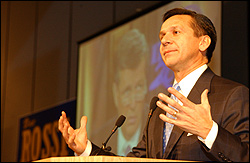Whether she wins or loses, Democrats have to be disappointed by the performance of their gubernatorial candidate. Attorney General Christine Gregoire started the race with incredible advantages. She is a popular, three-term, statewide office holder who had national bragging rights because of truly impressive leadership in the states’ lawsuit against big tobacco, the settlement of which brought Washington $4 billion. She is a woman—widely considered to be an advantage in a statewide race here. She is a moderate who opposes new taxes and gay marriage and supports abortion rights and business-friendly economic development. In the Democratic primary, Gregoire routed her opponent, King County Executive Ron Sims, giving the impression that her strategy, of running on a strong résumé but staying vague about how she would tackle specific issues, was connecting with voters. She led in every independent poll until the general election.
Yet at press time, the gubernatorial contest between Gregoire and Republican former state Sen. Dino Rossi of Sammamish was too close to call. The biggest prize in state politics hinged on the final tabulation of absentee ballots, maybe even the provisional ones—those cast by registered voters at the wrong polling place on Election Day.
The party that triumphs in the governor’s race will pronounce its election year strategy a success. Such a claim would be an overstatement, but in politics perception is mighty important. Given the relative positions of the two parties going into this election (Democrats held the higher state offices and one chamber of the Legislature), and given the ambitions of both parties (the Republicans wanted to reclaim relevance in Washington), the balance of power here will be determined by who moves into the governor’s mansion. A few thousand votes will decide who “won” Washington’s 2004 election. Why that party won will be less clear, if polls are to be believed.
When the early returns came in on election night, Nov. 2, Gregoire led not only throughout Western Washington but also in Spokane County. The rule of thumb is that early ballots are the most conservative, since they represent the wishes of older, Republican-leaning voters who cast their ballots by mail well before Election Day. For years, however, elections officials have been saying that the political balance of mailed ballots is changing, because so many of us use them now. Secretary of State Sam Reed is projecting that 60 percent of this year’s Washington ballots will have been cast by mail.
Meanwhile, so many more Election Day poll voters supported Rossi that by the end of the evening he was ahead of Gregoire in big Western Washington counties like Pierce and Snohomish. The rule of thumb was no longer a rule: People who made up their minds early voted for Gregoire, the Democrat. People who waited to vote at the polls, or mailed their ballots later, supported Rossi in greater percentages than the early mail voters.
What happened? The conventional wisdom is that Rossi successfully repeated his simple message of “change” with positive advertising, while the GOP relentlessly pounded Gregoire on the failure, under her watch, of the attorney general’s office to appeal a $17.8 million verdict against the state.
Gregoire, in turn, did not make an impression on the electorate. By the end of the campaign, nobody knew what she stood for or what she was going to do. She failed to craft a compelling campaign message.
Unfortunately, the results of Washington exit polling complicate this neat scenario of Rossi running a better campaign than Gregoire. Gregoire partisans say the exit poll, conducted for major media outlets by Edison Media Research and Mitofsky International, shows two things: Conservative Christians really helped Rossi, and Gregoire’s campaign message, that she could turn the economy around, did get through.
Meanwhile and unsurprisingly, Washington clearly differed from the rest of the country on matters of war and peace. Nationally, only 15 percent of voters ranked Iraq as their most important issue, placing it fourth, behind moral values, economy/jobs, and terrorism. In Washington, Iraq ranked first, identified by 26 percent of voters as the most important issue, followed by moral values, economy/jobs, and terrorism.
So while it’s clear Washington voters wanted Democrats to handle the nation’s foreign policy, when it comes to our own state’s future, the message is a whole lot murkier.
Exit pollsters interviewed 2,178 people statewide, according to the results posted by CNN.com. Like any poll, the findings are imperfect—this year, some would say, downright unreliable, especially considering only 40 percent of Washington voters could be represented in an exit poll because most of us vote by mail. But for the sake of discussion, let’s work with the results, which have a stated margin of error of plus or minus 4 percent.
Washington voters ages 18 to 29 made up 12 percent of Election Day poll voters. Again, the rule of thumb would be they would lean Democratic. But again, the rule of thumb would be wrong. These young voters supported Republicans for president (President Bush 49 percent, Massachusetts Sen. John Kerry 48 percent), for U.S. Senate (U.S. Rep. George Nethercutt of Spokane 51 percent, incumbent Patty Murray 48 percent), and for governor (Rossi 57 percent, Gregoire 43 percent). University of Washington communications professor John Gastil says that’s a testament to the strength of conservative Christian organizing. Young people, says Gastil, are hard for campaigns to reach because they do not belong in great numbers to political parties, unions, or other established groups. He claims there are two places to go to organize a turnout of young people: colleges and churches. Democrats favor the former, Republicans favor the latter. “Church-based mobilization must have been more effective than university-based mobilization,” says Gastil.
Twenty-one percent of Washington respondents said they are white, conservative, and Protestant. Pacific Lutheran University religion professor Patricia O. Killen says that is roughly equal to the percentage of white, conservative Protestants in the state as a whole. And 36 percent of voters polled said they attend church at least weekly. The argument that the conservative Christian factor was substantial is strengthened by the fact that, of the 20 percent of Washington voters who ranked moral values as the top election issue, 72 percent voted for Rossi and 27 percent voted for Gregoire.
As for who had the clearest message, the results are a little puzzling. A quarter of those polled said their candidate’s most important quality was the fact he or she would bring change. But 81 percent of these change-seekers favored Gregoire. So much for the simplicity and clarity of Rossi’s message that he would be the one to change things. And those who said the most important issue is the economy favored Gregoire, 73 percent to 25 percent. So much for Rossi’s contention that Democrats have botched the state economy.
Then there are the voters who supported Kerry for president and Murray for Senate, then switched parties when it came to governor. Washingtonians aged 30 to 44, who made up 26 percent of Election Day voters polled, chose Kerry 51 percent to 47 percent over the president and Murray 54 percent to 42 percent over Nethercutt but favored Rossi over Gregoire, 52 percent to 46 percent. Those making more than $50,000 a year showed a similar pattern: Kerry 53 percent to 46 percent, Murray 54 percent to 44 percent, and Rossi 52 percent to 47 percent. Finally, so did those living in the urban Puget Sound area, albeit more narrowly: Kerry 54 percent to 45 percent, Murray 57 percent to 39 percent, and Rossi 50 percent to 49 percent. There is no way to make these voters fit the profile of conservative Christians. So who are they?
Democratic consultant Christian Sinderman thinks he knows. “I could give you one of their phone numbers,” he jokes. “Lives in Issaquah, works in tech, and is a socially progressive libertarian. Thinks Bush is creepy but believes you need to clean house once in a while and change Olympia.”
Democrats won the state for Kerry and saw antiwar Murray re-elected to a third term. Voters returned to office all six Democratic incumbents among Washington’s nine U.S. representatives, re-elected four Democratic incumbent statewide office holders, extended Democratic control of the state House of Representatives to 55 of 98 seats, and now have Democrats occupying 26 of 49 state Senate seats. Says Sinderman: “We successfully put the brakes on a national trend. Washington remains a state where Democrats are strong.”
Indeed, Washington State Democratic Party Chair Paul Berendt can look at the results and smile. He employed a “full-court press” against the Republicans, trying to challenge their incumbents everywhere he possibly could, contesting each open seat with the best candidate he could find. This strategy paid off lower on the ballot, giving Democrats control of the state Legislature for the first time since 1994.
Republicans, though, can also claim noteworthy success. The GOP did not manage to pick off any incumbents in Congress or statewide offices, but that remains one of the hardest things to do in American politics. President Bush lost the state, but neither he nor his father had ever won it.
Washington State Republican Party Chair Chris Vance had modest ambitions for 2004—a sensible approach, considering the minority position in which the party found itself. Vance looked at the results of recent elections and concluded that state voters perceived the GOP’s past standard-bearers—like KVI-AM talk-show host John Carlson and conservative Christians Ellen Craswell and Linda Smith—as too extreme. Vance was determined that his candidates this year would lead with a smile instead of a sneer or a cross. Never mind that Rossi’s politics are as conservative as Carlson’s; his packaging was a lot warmer and fuzzier.
The Republicans concentrated their efforts on contesting two open seats, the highest-profile state offices, both being vacated by Democrats. The candidates—Rossi for governor and King County Council member Rob McKenna of Bellevue for attorney general—fit Vance’s profile perfectly. They are both charming, smooth, and from the voter-rich suburbs of populous King County. Both are very conservative, but neither has spent his career crusading on social issues. McKenna even favors legal abortion, though he opposes it personally and backs restrictions on it. Instead, both politicians have focused on conservative stances that can be attractive to independents and Democrats: lower taxes, less government, and plenty of pavement. McKenna handily beat former Insurance Commissioner Deborah Senn, though it didn’t hurt that he was bolstered by $3 million of independent advertising against her, bankrolled by big business.
Two incumbent GOP state office holders, meanwhile, also prevailed, as did the party’s one incumbent member of Congress. Republicans also fought off Democratic challengers in two other congressional districts, keeping seats that are being vacated by Republicans.
Rossi’s the sort who would use power astutely. As he showed during the 2003 state budget negotiations and in this year’s gubernatorial campaign, he has terrific ability when it comes to rhetoric. He knows how to craft a simple, compelling message. During the budget debate, it was, “Don’t raise taxes during a recession.” During the gubernatorial campaign, it was, “Twenty years of Democratic control of Olympia has ruined the state’s economy—it’s time for a change.” Once on message, Rossi just plain refuses to get off, and the power of repetition should not be underestimated.
The combination of Rossi and McKenna would be formidable. They can be the leaders of the Washington Republicans’ effort to get back into consistent contention. They can do this by encouraging candidate recruitment, railing against the Democratic Legislature, and being exciting prospects for election to higher posts. But if Rossi loses, life for Washington Republicans will continue to be less than rosy red.









